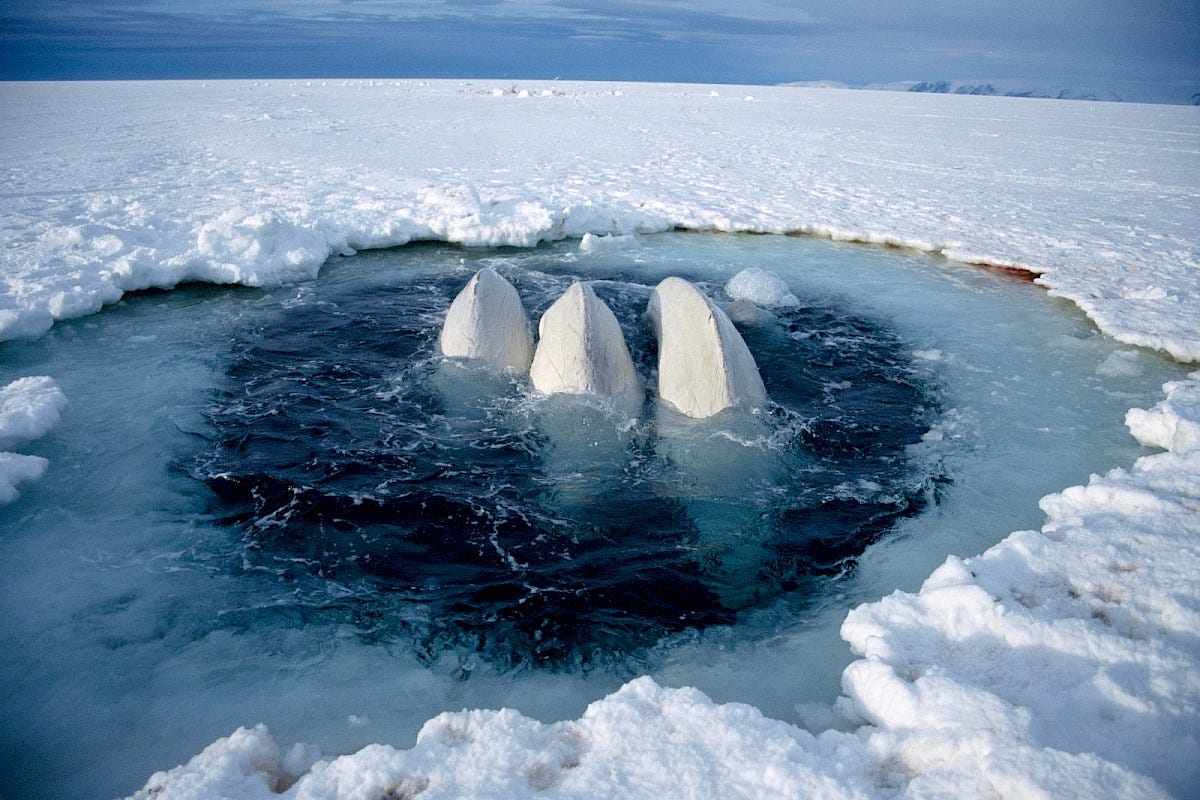Opera Daily 🎶 — "Operation Beluga" & Eugene Onegin
Hello friends,
In December 1984, a hunter spotted a herd of 3,000 Beluga whales in the Chukchi Peninsula (the easternmost part of Russia). While happy at first, the hunter and his group noticed something was wrong.
Beluga whales routinely hunt and hide beneath thick ice, but they must surface every twenty minutes to inhale air.
The weather had created a thick sheet of ice that had trapped the whales, and they were struggling for breathing room in a small pool of open water. And the whales couldn't get to the other side in one breath.
A decision was made to bring in the Moskva, an ice-breaking ship from Russia to help.
But once the ship finally got through the ice and to the herd, a new problem emerged: how to convince the whales to follow and not to fear the ship and the noise of its propellers before the ice could close up behind it.
After a frantic couple of days, someone mentioned playing music to attract the whales. Beluga whales have a very specialized sense of hearing and a highly developed auditory cortex.
The crew initially played different types of music from the top deck, but they noticed a change in the whales when the classical music came on.
They began to follow the ship and seemed to dance and play to the music.
The ship crew was able to rescue almost 2,000 trapped whales and led the creatures into open water.
The mission later became known as “Operation Beluga”.
Eugene Onegin
Today we are listening to Tchaikovsky’s most famous opera, Eugene Onegin.
🎧 Listening Example (3 minute listen): Russian soprano Anna Netrebko sings an excerpt from “Puskai pogibnu ya” (also known as Tatyana’s Letter Scene) from Act I of the Russian opera Eugene Onegin by Peter Illyich Tchaikovsky, Metropolitan Opera, Final Dress Rehearsal, September 2013
The opera is set in St. Petersburg, Russia, in the late 1700s.
Eugene Onegin comes to the home of Madame Larina and her two daughters Tatyana and Olga. Tatyana (soprano), who is very shy, finds herself infatuated with their newly-arrived neighbor Onegin (baritone).
Tatyana decides that the only way to express her love for Onegin is to write him a letter to explain her feelings towards him. Tatyana is not afraid to dig deep and expose her innermost thoughts. As she writes, you can sense her excitement and also trepidation, given the consequences of telling Onegin her feelings. But she doesn’t care; she goes for it.
Unfortunately, Onegin refuses Tatyana, but eventually, Onegin realizes that he loves Tatyana.
Just as in real life, the characters in Eugene Onegin are faced with situations that compel them to choose one path over another.
Want to hear Renée Fleming sing this role?
🎧 Listen here (final aria 4 minute listen, full scene 20 minute listen):
YouTube / Apple Music / Amazon Music / Spotify / Qobuz
Want more?
You don’t need to understand Russian to understand what Tatyana is going through here. You can hear it in her voice but also the orchestra. You will hear a repeated melody that transforms throughout the scene. Tchaikovsky uses the orchestra to represent Tatyana’s emotional state — the strings mimic her heartbeat, the oboe, and the flute mimic her writing, and the harp represents the motion of her refilling her pen in ink.
Based on Alexander Pushkin's text, all the main characters appear very young. At the beginning of the opera, Eugene Onegin is 26, Lensky is 17, and Tatyana is only 13 years old. Tatyana is probably about 17 years old by the end of the opera.
It appears that Tatyana wrote her letter to Onegin in French because her written Russian was not good enough. At that time, French was the language of “high society” in Russia, and for Tatyana, French was her primary language.
You have all gifted me with your attention this year, and I take that responsibility very seriously.
I wish you all the best for 2022 and look forward to sharing more this year.
Thank you for reading (and listening),
Michele
❤️ Enjoyed this piece? Hit the heart to like it. It helps others find Opera Daily.
📝A reminder that you can check out the complete Opera Daily archives and the playlist on YouTube for more selections. If you were forwarded this email by a friend, join us by subscribing:



Yes I am curious to know what made the belugas dance
Sorry, I am curious: what did they play exactly to the belugas? Do we know?